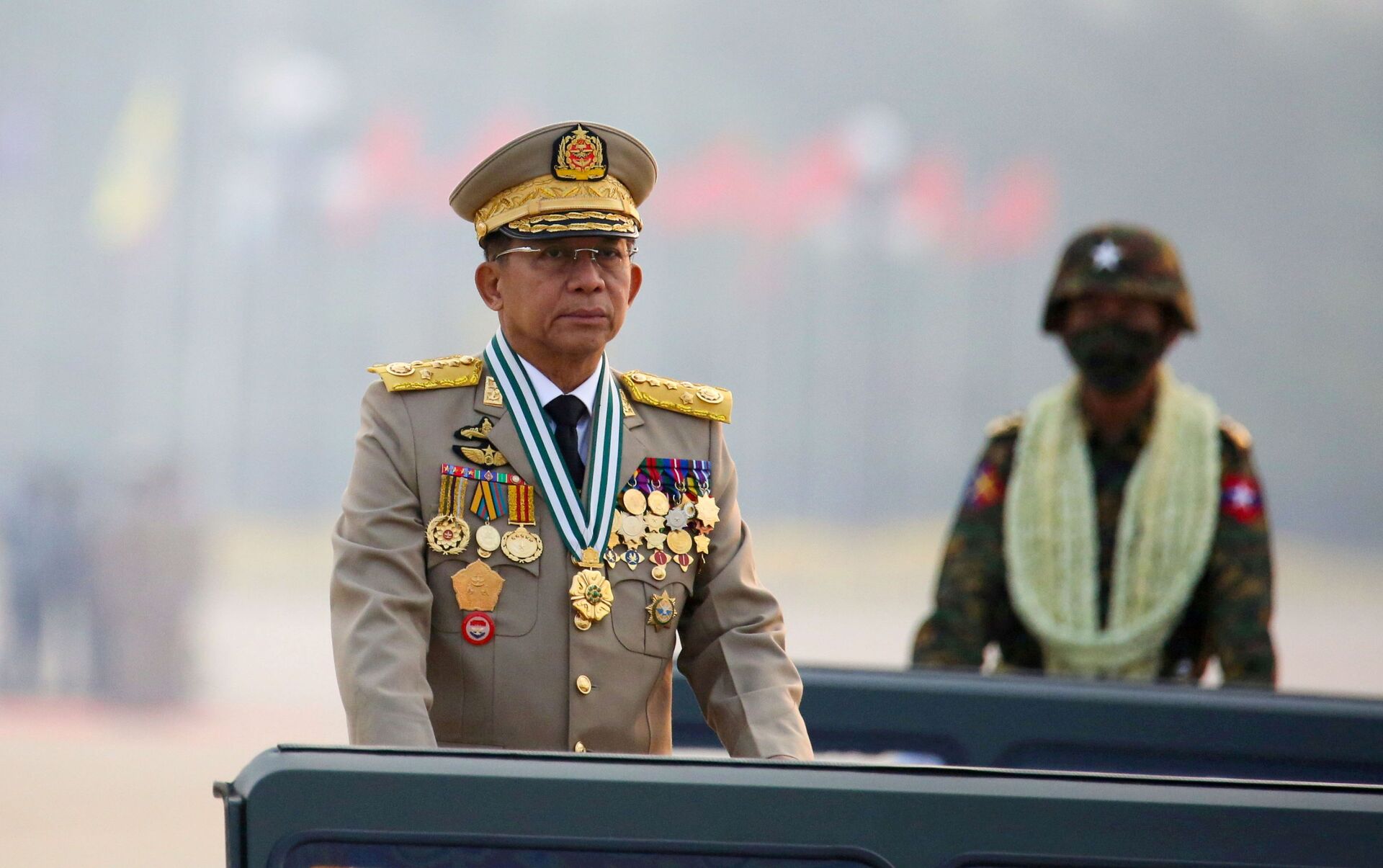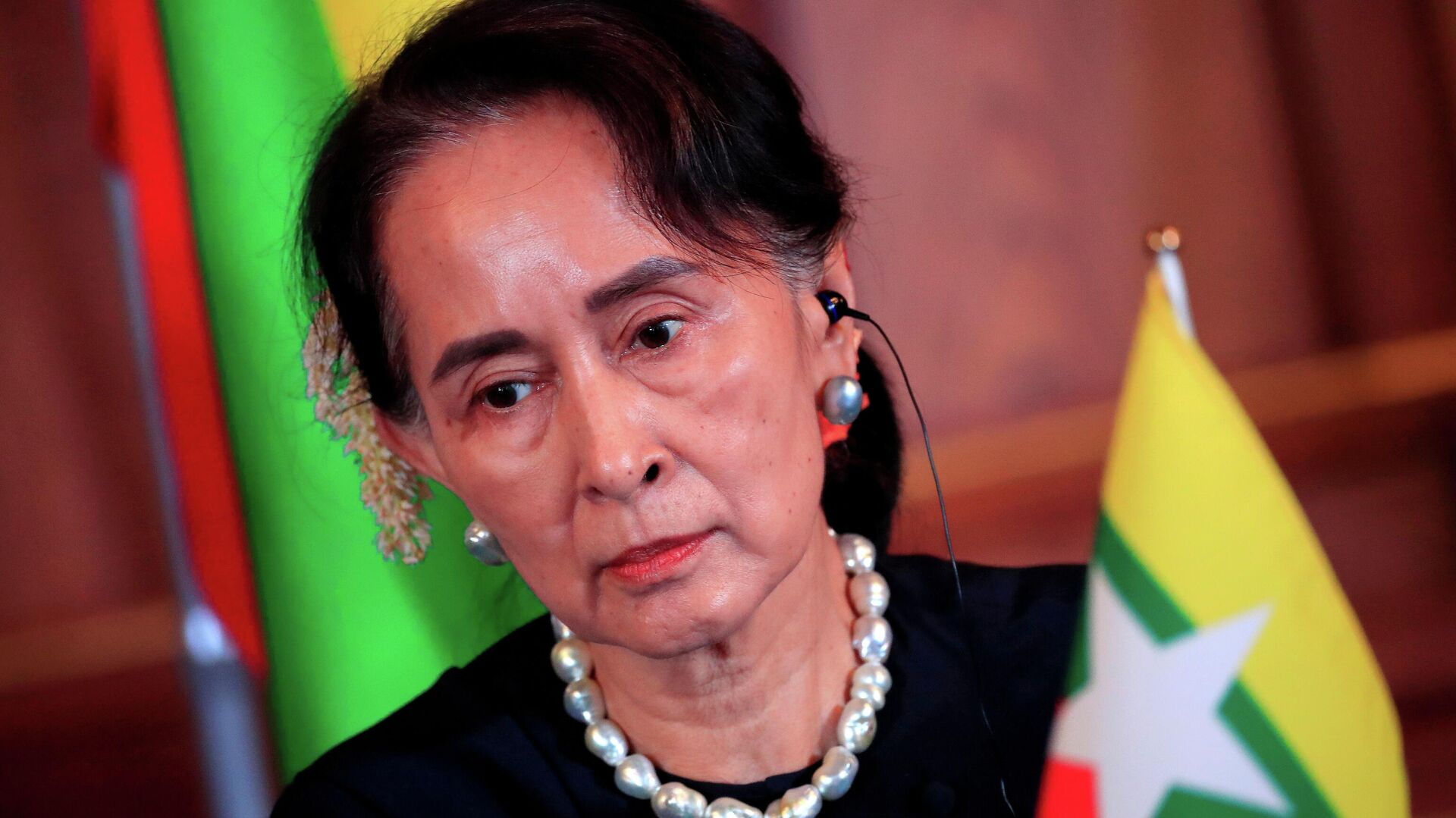ASEAN Urged to Recognize Myanmar’s Ousted National Unity Government After Snubbing Junta Chief
23:35 GMT 27.10.2021 (Updated: 23:36 GMT 27.10.2021)
Subscribe
After the Association of Southeast Asian Nations (ASEAN) decided to exclude leaders of Myanmar's military government brought to power in a February coup, the bloc is now facing pressure to pick sides in the country's political conflict and recognize a disempowered civilian government.
The 10-nation bloc, joined by a number of other partners including China and the United States, is holding its annual three-day summit virtually from Tuesday until Thursday. In a controversial move just days before the meeting, ASEAN members voted to disinvite Min Aung Hlaing, the head of Myanmar’s Tatmadaw military force who made himself Prime Minister in August after leading a coup against the civilian government.
"Today, ASEAN did not expel Myanmar from ASEAN's framework. Myanmar abandoned its right," Cambodian Prime Minister Hun Sen said. "Now we are in the situation of ASEAN minus one. It is not because of ASEAN, but because of Myanmar."
However, Myanmar wasn’t totally excluded, as an invitation was sent to a nonpartisan representative of the government, who declined to attend due to what it would do for the government’s image.
Sultan Hassanal Bolkiah of Brunei, which presently occupies ASEAN’s rotating chair, said in a Monday statement that Myanmar "needs both time and political space to deal with its many and complex challenges,” but added that ASEAN remains "committed to support Myanmar in its efforts to return to normalcy in accordance with the will of the people of Myanmar."
The bloc has never before excluded a country from its summit since its 1967 foundation and generally maintains a policy of non-interference. Myanmar’s Foreign Ministry has also said that disinviting Hlaing violates the ASEAN charter, another reason for them to not participate at all. However, they cautioned it also means Myanmar cannot be bound by decisions made in its absence.
At the summit, Indonesian President Joko Widodo said that while “it's important for us to honour the principles of non-interference … we're obligated to uphold other principles ... like democracy, good governance, respect for human rights, and a constitutional government.”

FILE PHOTO: Myanmar's military ruler Min Aung Hlaing presides over an army parade on Armed Forces Day in Naypyitaw, Myanmar, March 27, 2021. REUTERS/Stringer//File Photo
© REUTERS / STRINGER
‘Indecisiveness’ Fanned Violence
However, others have gone beyond simply making the military government feel unwelcome and are pushing ASEAN to recognize the National Unity Government (NUG), a group of lawmakers, ousted in the February 2021 coup, as well as representatives from ethnic groups against the junta. It is led by the National League for Democracy, the party of former state counsellor Aung San Suu Kyi, who was accused by the military of violating COVID-19 safety regulations and bans on importing certain radio technology and thus voiding the results of the November 2020 elections, which the NLD carried handily.
Charles Santiago, a member of the Malaysian parliament and chairman of ASEAN Parliamentarians for Human Rights (APHR), said in a Wednesday press conference that “much more needs to be done” by ASEAN to settle the situation in Myanmar, including for ASEAN to “meet officially and publicly with representatives of the duly elected NUG.”
“The [Myanmar] military seems to have shown total contempt of the ASEAN Leaders’ agreement,” he said, referring to an April agreement between Hlaing and ASEAN to stop the violence, which has claimed more than 1,200 lives and bordered on civil war, and to take necessary steps toward restoring democracy.
When he was appointed head of the caretaker government in August, Hlaing said that elections would be held in 2023.
Bo Hla Tint, NUG’s ambassador to ASEAN, has also called on the bloc to enter dialogue with the shadow civilian government.
"We are ready to work with ASEAN & the international community to ensure regional stability."
— APHR (@ASEANMP) October 27, 2021
The @NUGMyanmar new Ambassador to ASEAN U Bo Hla Tint also spoke this morning, on the NUG's willingness to engage with ASEAN and other actors to resolve #Myanmar crisis. pic.twitter.com/ZGJNTWaOKl
“It is very obvious that the 2020 election provided popular support and legitimacy to the NUG government,” Tint said at the presser. “Only NUG has the legitimacy from the people to work with the regional and international community.”
“We will be a very responsible partner in the region. We want to be part of the ASEAN Community in a constructive way,” he added.
Khin Ohmar, head of the pro-democracy group Progressive Voice Myanmar, said that ASEAN’s “indecisiveness” had actually caused further bloodshed in Myanmar, warning that the crisis has already reached a “breaking point with no signs of stopping.”
“Over 250,000 [have] been forced to flee from the junta’s attacks. The junta is also planning a new wave of operations, and this is a form of collective punishment against the people for standing up against their failed coup,” she said. “It should be very clear to ASEAN by now that ASEAN alone cannot tackle the crisis in Myanmar. This crisis has been created by the military, and thus, working with the junta will only bring more harm to the people.”
More than 9,000 people have been arrested since the coup, including activists, journalists, government employees, and medics. The government released 5,600 of them last week in an apparent mass amnesty, but warned if they were re-arrested - as more than 100 were immediately after their release, according to Human Rights Watch - they would be forced to serve their full sentences, plus whatever new charges were brought against them.
In August, Brunei sent Second Foreign Minister Erywan Yusof to meet with Kyi and other detained civilian leaders, but was blocked earlier this month by the junta because they face criminal charges.
Kyi appeared before a court in the capital of Naypyidaw on Tuesday to give testimony in the case against her and other officials, including Win Myint, who was president at the time of the coup. However, the courtroom was closed to the public and a gag order imposed by the government on her legal team has prevented almost any news from getting out about the proceedings.

